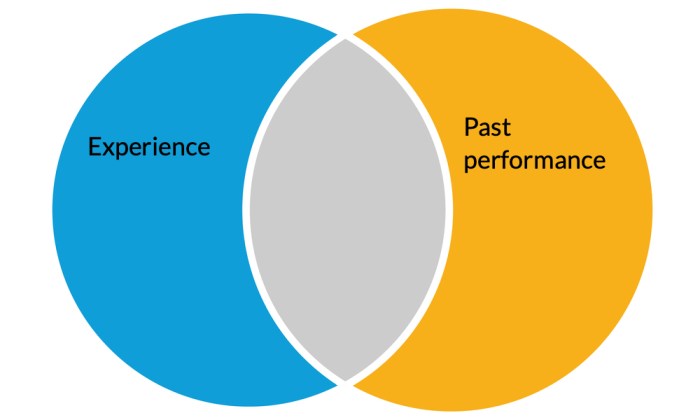An offeror’s past performance as an evaluation factor consists of – An offeror’s past performance is a crucial evaluation factor that provides valuable insights into their capabilities and suitability for a particular project. By assessing an offeror’s track record, organizations can make informed decisions, minimize risks, and enhance project success.
This evaluation process involves gathering, analyzing, and documenting past performance data, considering factors such as relevance, recency, and quality. Various methods are employed to collect data, including surveys, interviews, and performance reports.
Evaluating Past Performance as a Factor in Offeror Selection

Evaluating an offeror’s past performance is a crucial step in the procurement process, as it provides valuable insights into their capabilities, reliability, and overall suitability for a particular project or contract.
By examining an offeror’s track record, organizations can assess their ability to deliver on contractual obligations, meet performance standards, and manage risks effectively.
Benefits of Using Past Performance as an Evaluation Criterion, An offeror’s past performance as an evaluation factor consists of
- Predicts Future Performance: Past performance serves as a strong indicator of future performance, as it demonstrates the offeror’s actual capabilities and experience in similar projects.
- Identifies Potential Risks: Evaluating past performance helps identify potential risks associated with an offeror, such as delays, cost overruns, or quality issues.
- Promotes Accountability: Holding offerors accountable for their past performance fosters a culture of responsibility and encourages continuous improvement.
Limitations of Using Past Performance as an Evaluation Criterion
- Recency and Relevance: Past performance may not always be reflective of an offeror’s current capabilities, especially if significant time has passed or the scope of the project has changed.
- Subjectivity: Evaluating past performance can be subjective, as different organizations may have varying standards and interpretations of what constitutes acceptable performance.
- Inhibiting Innovation: Over-reliance on past performance may discourage offerors from proposing innovative or alternative approaches.
Clarifying Questions: An Offeror’s Past Performance As An Evaluation Factor Consists Of
What are the benefits of considering past performance in evaluation?
Past performance evaluation provides insights into an offeror’s capabilities, reduces project risks, and improves decision-making.
What factors should be considered when evaluating past performance?
Relevance, recency, quality, and scope of the past performance are important factors to consider.
What methods are used to assess past performance?
Surveys, interviews, performance reports, and site visits are common methods used to gather past performance data.


